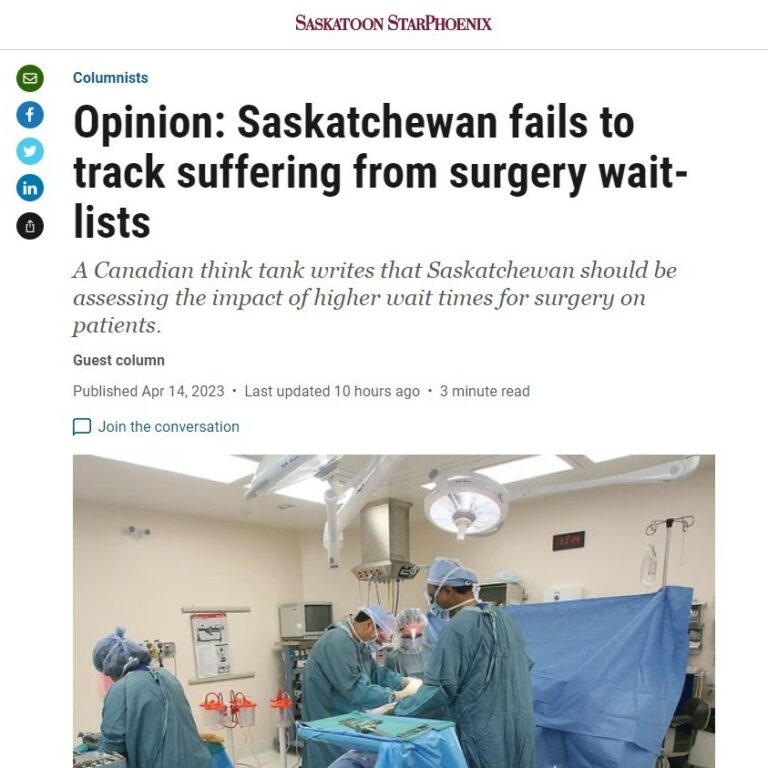The odds are you know someone who’s currently on a health-care wait-list.
Right now, there are more than 34,000 Saskatchewan residents waiting for surgery alone. Wait times have only been getting worse over the years: the Fraser Institute reports that the median wait time for surgery in Saskatchewan in 2022 was more than 30 weeks; up from 14 weeks in 2014.
That’s just the median wait; there are plenty of examples of people waiting well over a year for procedures like hip surgery.
But what isn’t talked about often enough is how much suffering is caused by these long wait times. Sure, waiting a year or two for hip surgery is painful and makes it hard to move around, but the long-term health consequences can be a lot worse than that.
For one, patients are often prescribed painkillers while waiting for the care they need. Consider Sharon Kilkenny from Emerald Park. She faced a 93-week long wait for hip surgery.
Her doctors started her on a painkiller, but she quit shortly after for fear of getting addicted and potentially dealing with liver damage down the line.
Mental health is another major concern. Think about the truly blood-curdling story of Jolene Van Alstine. As the Regina Leader-Post reported in late 2022, she’s been suffering on a waitlist for more than six years with a painful thyroid condition.
She copes with splitting abdominal pain and bone fractures, which have led her to develop depression. It’s got so bad that she’s actively considering assisted suicide.
With stories like this, one would think the government would be concerned with tracking or analyzing patient suffering during wait times and identifying problem areas.
You’d be wrong to assume that.
SecondStreet.org’s latest policy brief explores this issue in further detail. We filed freedom of information requests with every provincial government, asking them to provide any memos, analysis or reports on patient suffering while waiting long periods for surgery and other health services.
Not a single province provided any documents, including Saskatchewan. This province said those documents do not exist. How is it possible to address the problem if you’re not even talking about it?
One option would be for governments to survey patients from time to time to ask what they’re experiencing. If, for example, they’ve been suffering from depression, the government could, perhaps, offer counselling and other mental health services.
But that doesn’t address the fundamental problem of waitlists. The Moe government has made some positive steps on health reform. For instance, last summer, Premier Scott Moe committed to contracting out more taxpayer-funded surgeries to private providers, to help reduce the surgical backlog.
This is good, but more can be done.
One option that could help patients immediately would be to copy the European Union’s Cross-Border Directive, a policy SecondStreet.org has written about extensively in the past.
In short, it would allow patients to pay for surgery in another province or country, then be reimbursed by the Saskatchewan government — up to what the province would have paid for the procedure locally.
This would not only allow more patients to avoid long waiting lists, those who choose to remain in Saskatchewan for surgery would get to move up a spot in line each time someone ahead of them in line decides to try this new policy.
The Saskatchewan government has shown in the past that it’s willing to lead and try new initiatives in health care. Copying Europe’s Cross-Border Directive is an outside-the-box option that could help patients immediately without breaking the government’s budget.
One thing is clear, many patients are suffering. More action is needed to help them.
Dom Lucyk is the communications director with SecondStreet.org, a Canadian think tank.
This column was originally published in the Saskatoon Star Phoenix on April 14, 2023.
Share on Facebook
Share on Twitter
You can help us continue to research and tell stories about this issue by making a donation or sharing this content with your friends. Be sure to sign up for our updates too!








